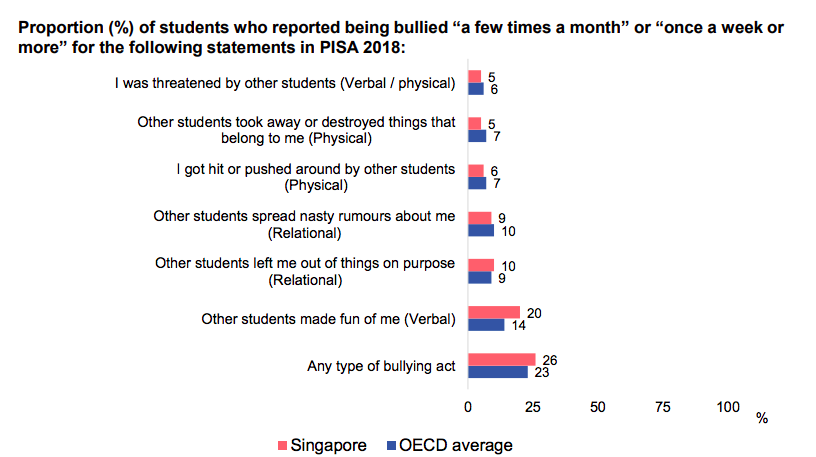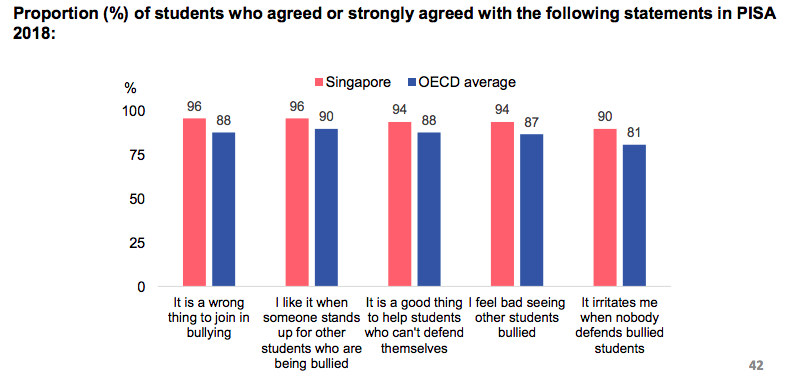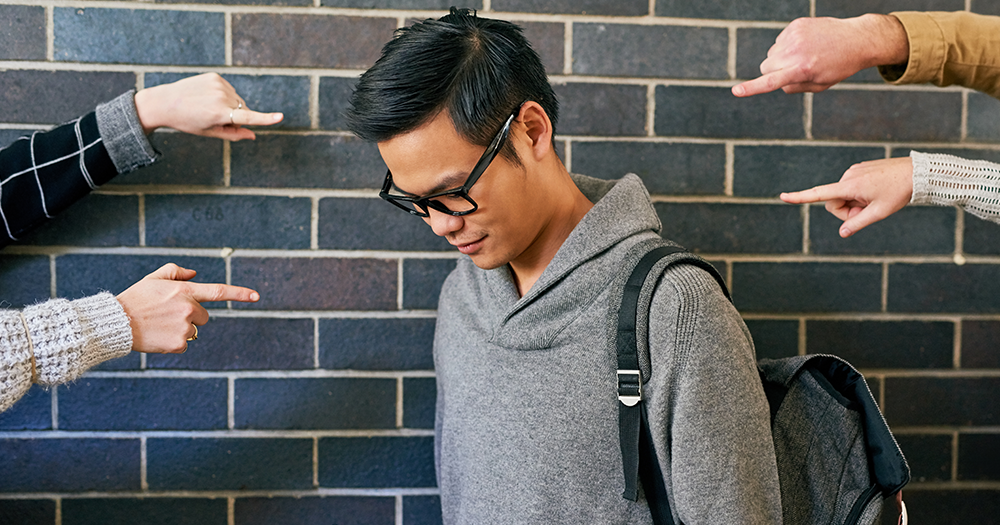More than one of every four 15-year-old students in Singapore schools say they are bullied a few times a month.
This finding emerged as part of the triennial Program for International Student Assessment (PISA) for 2018, conducted by the Organisation for Economic Cooperation and Development (OECD), which evaluates the overall quality of learning among 15-year-old students in 79 participating education systems.
Singapore has been a participant of PISA since 2009, and is just one of 79 education systems that participated in 2018's study.
In total, 6,676 students from 153 public secondary schools and 13 randomly sampled private schools in Singapore participated in PISA 2018.
Bullying statistics in Singapore higher overall than OECD average
One component of the PISA study assessed participating countries' secondary school climate, including the different types of bullying 15-year-old students here experienced.
In particular, the study identified six different types of bullying and showed the percentage of these students who reported being bullied "a few times a month" or "once a week or more":
 Image via MOE
Image via MOE
In case you can't see, here are the six different types of bullying:
- I was threatened by other students (verbal/physical)
- Other students took away or destroyed things that belong to me (physical)
- I got hit or pushed around by other students (physical)
- Other students spread nasty rumours about me (relational)
- Other students left me out of things on purpose (relational)
- Other students made fun of me (verbal)
For item number six, more students in Singapore reported experiencing it than those across the rest of the OECD.
It was found that 26 per cent of 15-year-old students in Singapore report being bullied with any one of the six bullying acts at least a few times a month, compared to 23 per cent on average across OECD countries.
However, 94 per cent of these students also agreed or strongly agreed that it is a good thing to help students who cannot defend themselves, higher than the 88 per cent among the OECD average.
 Image via MOE
Image via MOE
Altogether, at least nine in 10 Singapore students agreed with all five statements on anti-bullying attitudes.
In case you can't see them in the graphic, these are the five statements:
- It is a wrong thing to join in bullying
- I like it when someone stands up for other students who are being bullied
- It is a good thing to help students who can't defend themselves
- I feel bad seeing other students bullied
- It irritates me when nobody defends bullied students
Frequently bullied students more likely to skip school
Up to two weeks prior to the PISA test in Singapore, 13 per cent of the students polled said they had skipped one day of school, while 37 per cent of students said they had arrived late for school.
Thankfully, this is lower than the OECD average of 21 per cent of students skipping at least one day of school and 48 per cent of students arriving late for school.
In most countries and economies, frequently bullied students were more likely to have skipped school.
On the other hand, students who valued school, enjoyed a better disciplinary climate and received greater emotional support from parents were less likely to have skipped school.
Bullying prevention and intervention measures
In response to these statistics, the Ministry of Education (MOE) said it has been working with schools to put in place bullying prevention and intervention measures.
Some of these include:
- Building resilience in students to help them cope with the negative actions of others, and to overcome challenges associated with bullying
- Sending a clear message to all students that any form of bullying is not acceptable and is considered a school offence with serious consequences
- Making channels accessible for the safe reporting of bullying cases
- Investigating and following up promptly on reported cases, carrying out appropriate disciplinary actions for offenders, and providing support for the victims and engaging the parents
- Adopting an educative approach to help all students, including bystanders, learn from the incident and prevent further bullying
- Training School Counsellors to support students who have been bullied or are bullies and help them mend relationships with their peers
MOE has also stated that they will continue to emphasise pro-social behaviours and positive values such as respect, care and empathy in students, as well as promote positive peer support to provide a safe and secure environment in schools.
Top image via Wendy Tan on Unsplash
Content that keeps Mothership.sg going
??
We compare the colleagues you can't stand to these animals.
✈️?️
Click here for an itinerary for first time solo travellers.
????
Have you ever felt like a boomer in your 20s?
If you like what you read, follow us on Facebook, Instagram, Twitter and Telegram to get the latest updates.
